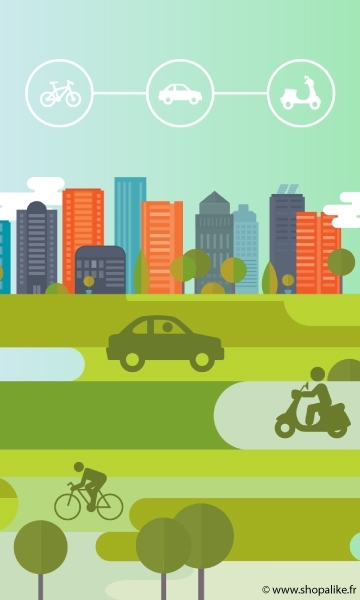Now the Mobility Week has ended, smartcity.brussels is listing a number of initiatives that make mobility in the Brussels-Capital Region ‘smarter’ and, at the same time, tie in seamlessly with the theme of the 2020 edition of Mobility Week: the importance of accessible, emission-free transport and the promotion of an inclusive framework for all.
Last week, for example, Handycab, an initiative by the taxi sector for persons with reduced mobility (PRM), was launched. This new booking platform and app fully centralises the provision of adapted taxis in the Brussels-Capital Region for people with reduced mobility.
The application was developed by professionals from the taxi sector after consultation with people and associations active in the field of accessibility for PRMs. After attending a training course, placing a separation kit in the taxi that guarantees compliance with the distance regulations, and complying with the quality charter, the taxis can get to work. With Handycab, they are also committing themselves to serving PRM customers with priority.
More information at:
https://handycab.be/index.php/en
STIB was not idle either: since this summer, STIB users have been able to pay contactless on the entire STIB network. Journeys are validated directly with a payment card, smartphone or smartwatch on any metro, bus or tram using a validation device, specially provided for such contactless payments. Not only do travellers no longer have to buy a ticket in advance or have cash with them, but this contactless payment is also somewhat better at containing the spread of coronavirus. Contactless payment at the STIB is therefore a great success: 54,501 journeys were made contactless in July, 75,334 in August, and usage is increasing every day.
STIB also launched a MaaS app, the all-in-one mobility service “MoveBrussels”, in testing mode during Mobility Week. Anyone who wanted to and signed up could try this app for free. We had already talked about this testing
on this site..
The test is now effectively running over the next few months, with STIB asking participants to carry out a number of tasks in order to make extensive use of the app. An online platform allows testers to pass on their respective experiences and recommendations.
MoveBrussels is part of the ‘MaaS’ (Mobility as a Service) project, where the application functions as an all-in-one mobility service. It brings together all modes of transport (from public transport to shared bicycles, scooters and cars, etc.), making it easier and more efficient for people to travel in Brussels. With the app, they can plan a door-to-door journey in just a few clicks, reserve and pay for journeys and means of transport, open metro gates, unlock scooters, etc.
Anyone who wants to take part in the tests can register on STIB's website, enter their MoBIB card number and install the MoveBrussels app on their smartphone.
For more info and to register as a tester, please go to:
https://maas.stib-mivb.brussels/
The need for a single app is demonstrated by the following initiative. In order to present the many mobility apps that have since seen the light of day, Brussels Mobility created a handy overview of all existing apps on its website.
With a long list for each mode of transport, this regional public service lists all the mobility apps that can be used in Brussels in a smart way. From shared bikes, to scooters, to public transport and useful help with parking ... everyone will find something to their liking.
A ‘MaaS’ solution with an application like an all-in-one mobility service will be a big step in the right direction. In anticipation of this all-in-one solution, everyone can browse through all existing apps.
More info at:
https://mobilite-mobiliteit.brussels/en/apps.
And in order to list everything related to smart mobility, the Smart City Institute of the University of Liège (ULG) published a new edition of its “Practical Guide to the Smart City: ‘Guide Pratique de la Smart City: ‘La mobilité de demain (The mobility of tomorrow)' on the occasion of Mobility Week.
In this work, sustainable and smart mobility come first. It answers the question: how can we ensure mobility for citizens that is sustainable, efficient and respectful of the environment and health, taking advantage of the new innovations available?
To make this clear and to support the key players in mobility, the Smart City Institute published this small practical guide: a benchmark of knowledge and examples around the latest developments in smart mobility.
More info and download the guide at:
http://labos.ulg.ac.be/smart-city/en
